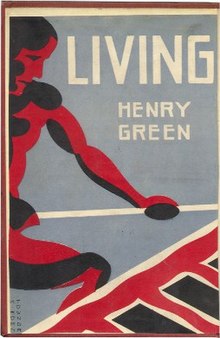Henry Green's Living tells the story of iron foundry workers in Birmingham, England. These men struggle, against dangerous and repressive work practices, and the monotony of everyday work, to "make a living." But the word, when used that way, seems reduced somehow, as if the manifold experience of life has been reduced to the pettiness of living by the tedious horror of industrial labor. Yet, they shape their lives around this experience, like the antiquated Craigan:
Mr Craigan had gone to work when he was nine and every day he had worked through most of daylight till now, when he was going to get old age pension. So you will hear men who have worked like this talk of monotony of their lives, but when they grow to be old they are more glad to have work and this monotony has grown so great that they have forgotten it. Like on a train which goes through night smoothly and at an even pace--so monotony of noise made by the wheels bumping over joints between the rails becomes rhythm--so the monotony of hours grows to be the habit and regulation on which we grow old.
Craigan lives with his friends and coworkers Jim Dale and Joe Gates (try keeping which is which in your head without double-checking each time, I dare you). Gates' daughter Lily keeps the house, and Craigan sets his hopes on her marriage to Jim Dale, which will ensure the continued existence of this household in the face of the threat of financial instability. Of course, Lily has plans of her own, and falls in love with another iron worker, Bert Jones. Lily, too, has a kind of "living," as proscribed by the men in her life as the iron workers are by the demands of their class. Added to this are numerous other characters of the foundry, managers and manager's toadies and son of Mr. Dupret, the heir to the foundry who's sudden accession threatens the stability of the foundry's small ecosystem. The rich young Dupret is unhappy and bored in his wealth, and sees something to envy in the lives of the foundry workers:
Standing in foundry shop son of Mr Dupret thought in mind and it seemed to him that these iron castings were beautiful and he reached out fingers to them, he touched them; he thought and only in machinery in seemed to him was savagery left now for in the country, in summer, trees were like sheep while here men created what you could touch, wild shapes, soft like silk, which would last and would be working in great factories, they made them with their hands. He felt more certain and he said to himself it was wild incidental beauty in these things where engineers had thought only of the use put to them, which you could touch; but when he was most sure he remembered, he remembered it had been said before and he said to himself, 'Ruskin built a road which went nowhere with the help of undergraduates and in doing so said the last word on that.' And then what had been so plain, stiff and bursting inside him like soda fountains, this died as a small wind goes out, and he felt embarrassed standing as he did in fine clothes.
And yet there's nothing humanitarian about Dupret; his desperate need to exert control over his father's company and wrench it away from the middle managers who treat him like a neophyte produces results both good and bad for the workers. Yes, he demands that they remove the guard who clocks the workers' bathroom time, but when the foundry comes up against financial straits, he's also the one who suggests sacking its most experienced workers, like Craigan, six months shy of their pension. Though he envies their ability to create (paging Marx), his life is too far removed from that of the foundry workers for it to affect his decision making (paging Elon Musk).
I struggle with helping my creative writing students find the right amount of exposition. Most amateur fiction is all exposition, elaborate setups that leave mere paragraphs or sentences for anything like conflict or action. Green's strategy is to do away with exposition entirely; there are no explanatory paragraphs explaining who any of the novel's many characters are. It's a bit like walking into a strange room and watching people interact and trying, and often failing, to piece together who they are and what they're about. Added to that is this novel's particular, difficult style, which often eliminates articles entirely. "Thousands came back from dinner along streets," the novel begins. I read that this reflects something about the Birmingham accent, but I'm not sure of that--it certainly gives the novel, a brusque, spiked tone.
Like Loving, which contrasted the lives of nobility with their servants, Living is an effective juxtaposition of classes that reveals hard truths about the nature of the working world. Reading it can feel a little like work, too. But for those that can stand it, it's a rewarding labor, full of sharp insight into the world of the working class.


1 comment:
Dare accepted.
Post a Comment